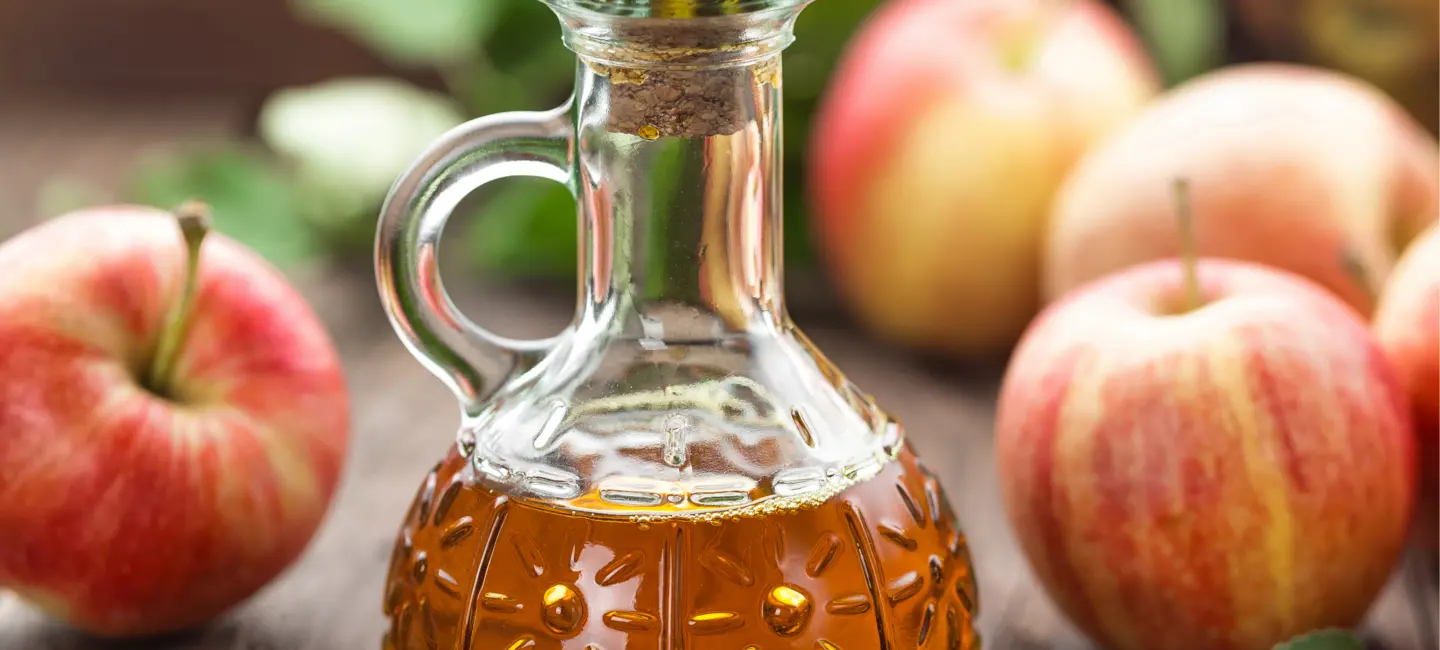
Apple cider vinegar is the fermented juice from crushed apples. It contains acetic acid and nutrients such as B vitamins and vitamin C.
Apple cider vinegar is popularly used in salad dressings and cooking. But it's also been used traditionally as medicine. It might help lower blood sugar levels after a meal by changing how foods are absorbed from the gut.
Apple cider vinegar is used for obesity, diabetes, athletic performance, kidney stones, and many other purposes, but there is no good scientific evidence to support any of these uses. There is also no good evidence to support using apple cider vinegar for COVID-19.
Is It Effective?
NatMed Pro rates effectiveness based on scientific evidence according to the following scale: Effective, Likely Effective, Possibly Effective, Possibly Ineffective, Likely Ineffective, Ineffective, and Insufficient Evidence to Rate.
- Diabetes. Taking apple cider vinegar by mouth doesn't seem to lower blood sugar levels in people with type 2 diabetes.
There is interest in using apple cider vinegar for a number of other purposes, but there isn't enough reliable information to say whether it might be helpful.
Is it Safe?
When taken by mouth: Consuming apple cider vinegar in food amounts is likely safe. Apple cider vinegar is possibly safe when used as a medicine, short-term. But it is possibly unsafe when used in large amounts, long-term. Consuming large amounts of apple cider vinegar long-term might lead to problems such as low levels of potassium.
When applied to the skin: Apple cider vinegar is possibly unsafe. Applying apple cider vinegar to the skin can cause chemical burns in some people.
Special Precautions & Warnings:
Pregnancy and breast-feeding: There isn't enough reliable information to know if apple cider vinegar is safe to use as a medicine when pregnant or breast-feeding. Stay on the safe side and stick to food amounts.
Low potassium levels in the blood (hypokalemia): Apple cider vinegar might lower potassium levels in the blood. If your potassium is already low, apple cider vinegar might make it too low. Don't use apple cider vinegar if you have this condition.
Digoxin (Lanoxin)
Interaction Rating=Moderate Be cautious with this combination.
Large amounts of apple cider vinegar may decrease potassium levels in the body. Low potassium levels can increase the side effects of digoxin.
Insulin
Interaction Rating=Moderate Be cautious with this combination.
Insulin might decrease potassium levels in the body. Large amounts of apple cider vinegar might also decrease potassium levels in the body. Taking apple cider vinegar along with insulin might cause potassium levels in the body to be too low.
Medications for diabetes (Antidiabetes drugs)
Interaction Rating=Moderate Be cautious with this combination.
Apple cider vinegar might lower blood sugar levels. Taking apple cider vinegar along with diabetes medications might cause blood sugar to drop too low. Monitor your blood sugar closely.
Water pills (Diuretic drugs)
Interaction Rating=Moderate Be cautious with this combination.
Apple cider vinegar can decrease potassium levels. "Water pills" can also decrease potassium levels. Taking apple cider vinegar along with "water pills" might make potassium levels drop too low.
Herbs and supplements that might lower blood sugar: Apple cider vinegar might lower blood sugar. Taking it with other supplements with similar effects might lower blood sugar too much. Examples of supplements with this effect include aloe, bitter melon, cassia cinnamon, chromium, and prickly pear cactus.
Herbs that contain cardiac glycosides: Apple cider vinegar can lower potassium levels. Some herbs contain cardiac glycosides, which can affect the heart. Using apple cider vinegar along with herbs that contain cardiac glycosides can increase the risk of serious side effects from low potassium levels. Examples of supplements that contain cardiac glycosides include black hellebore, foxglove, lily-of-the-valley, oleander, and pleurisy root.
Horsetail: Using apple cider vinegar along with horsetail could increase the chance that potassium levels might drop too low.
Licorice: Using apple cider vinegar along with licorice could increase the chance that potassium levels might drop too low.
Stimulant laxative herbs: Apple cider vinegar can lower potassium levels. Stimulant laxatives can cause diarrhea and also decrease potassium levels. Taking apple cider vinegar with stimulant laxative herbs might cause potassium levels to go too low.
There are no known interactions with foods.
Apple cider vinegar is commonly used in foods. In the US, there's no specific definition of what a product must contain to be called apple cider vinegar. Sometimes it's standardized to acidity, with concentrations ranging from 4% to 8%. But the amount of each component of apple cider vinegar may vary from product to product.
When used as medicine, there isn't enough reliable information to know what an appropriate dose of apple cider vinegar might be. Speak with a healthcare provider to find out what dose might be best for a specific condition.
ACV, Cider Vinegar, Vinagre de Manzana, Vinagre de Sidra de Manzana, Vinaigre de Cidre.
Information on this website is for informational use only and is not intended to replace professional medical advice, diagnosis, or treatment. While evidence-based, it is not guaranteed to be error-free and is not intended to meet any particular user’s needs or requirements or to cover all possible uses, safety concerns, interactions, outcomes, or adverse effects. Always check with your doctor or other medical professional before making healthcare decisions (including taking any medication) and do not delay or disregard seeking medical advice or treatment based on any information displayed on this website.
© TRC Healthcare 2024. All rights reserved. Use and/or distribution is permitted only pursuant to a valid license or other permission from TRC Healthcare.
